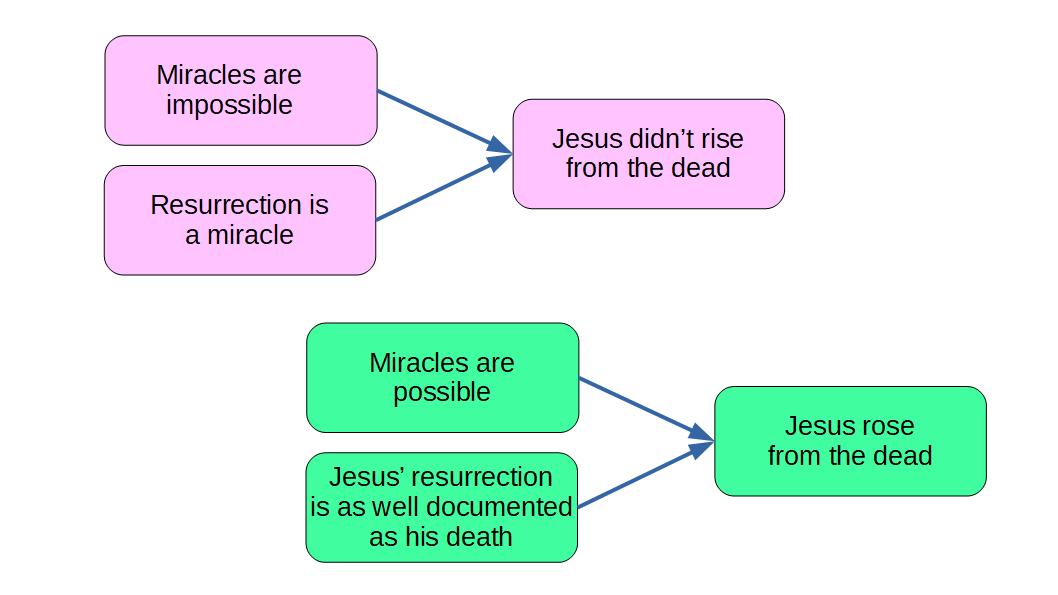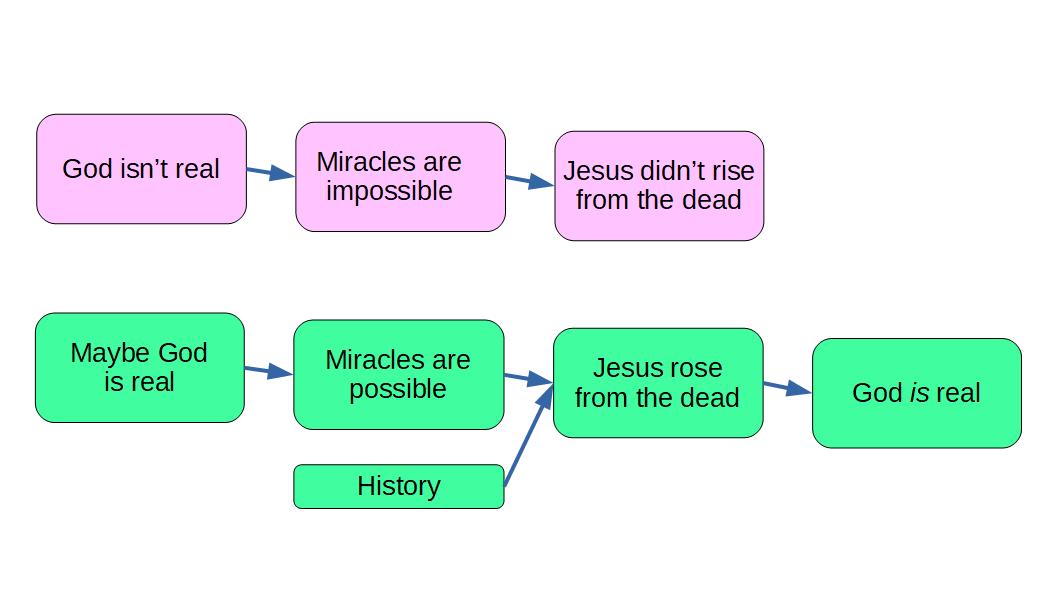"I apologise for
believing in God"
This is a text version of my video here: https://youtu.be/sEoa4fBFXHk
Maybe that's a "clickbait" title. Those who know me know that I do believe. I don't mean I'm sorry for believing, I mean "apologise" as in "account for why I do something". I'm going to do "apologetics": explaining the reasons why a belief is possible.
In our society many say they don't believe in God, and moreover they regard belief as irrational. Such belief is often labelled "superstition" or "fairy story". Some grandly say, "There's no empirical evidence for the existence of God".
I think they're wrong. I think there are a variety of good reasons to believe in God. In this essay I'm going to focus on just one reason: a person; Jesus.
Again, many people dismiss Him. Some say He never existed, or that the things written about Him are all wrong (which is really the same thing).
However, historians agree that he did exist. In fact, the consensus among historians is that all these people (among others) were real:-
Jesus of Nazareth
Simon Peter
John the Apostle
Mary Magdalene
John the Baptist
Pontius Pilate
James the brother of Jesus
Saul (Paul) of Tarsus
Simon Peter
John the Apostle
Mary Magdalene
John the Baptist
Pontius Pilate
James the brother of Jesus
Saul (Paul) of Tarsus
I'm going to insist on the historical reality of these people. If anyone still says they're fictional, I'm going to point out what they're doing: disagreeing with the consensus of experts in their specialist field. That's what conspiracy theorists do, and I don't need to take such ideas seriously. So I say these people listed here were all real.
Well, some will say that Jesus might have been a real person, but a lot of untrue stories have been written about what he did. Aren't some of the miracles hard to believe?
To think about this, I don't think we need to consider all the miracles one by one. One of them puts all the others in the shade, and at Easter you can guess which one I mean. If Jesus rose back to life after he was killed, the other amazing things he's said to have done won't be hard to believe. If he didn't, all the rest is just stories.
Once "New Scientist" published an article in which someone asked, "Jesus performed 'miracles' such as changing water into wine, raising the dead and walking on water... Why were the phenomena so restricted?"
I wrote them a letter in which I said:
May I ask what would be
considered "unrestricted"? I can only think of one
additional test: kill the alleged charlatan (in public, with plenty
of witnesses), have the body guarded in a secure place, and see
whether he can bring himself back from the dead. If he can, perhaps
his claims should be taken more seriously...
Naturally they didn't print it.
But can we really believe that Jesus rose back to life after he was killed?
Again, historians agree that the following events among those real people really happened:
- John the Baptist baptised Jesus of Nazareth.
- Jesus gained a reputation for working miracles.
- Jesus was put on trial by the Jewish priests and by Pontius Pilate.
- Pontius Pilate condemned Jesus to death by crucifixion at Jerusalem.
- Jesus was claimed by his followers to be alive after he was killed.
Clearly historians don't agree that Jesus returned to life after he was killed, because that's a miracle and historians always look for natural explanations.
However, we can be sure that if it wasn't a miracle, they would accept it, for the simple reason that:
Every ancient written reference to Jesus' death also mentions his alleged resurrection.
- Not just the accounts in the Bible; all of them.
What are we to make of this? Can someone rise from the dead or not? We can reason as in this diagram:

Some will say that they can't. Being mischevious, I could examine the question by asking whether any instances of miracles have ever been recorded, but some won't be willing to do that! Now I'll ask, "Why not?"
It's because of unstated assumptions. Someone who doesn't believe in God obviously cannot believe that He does miracles! Now the reasoning can be stated more fully:

Wait, do we have to go to such lengths? Can we reconcile history and natural explanations, accepting that Jesus was real, accepting many of the things he said and did, but leaving out his resurrection? Maybe he just said non-contentious things like "blessed are the peacemakers" and "do to others as you would have them do to you" and so on, and that's why people thought he was wonderful?
We have to take note that he's also quoted as repeatedly saying that God was his Father and that he would go to Jerusalem, be killed and on the third day rise again:
“We
are going up to Jerusalem,” he said, “and the Son of Man
will be delivered over to the chief priests and the teachers of the
law. They will condemn him to death and will hand him over to the
Gentiles, who will mock him and spit on him, flog him and kill him.
Three days later he will rise.”
Mark 10:33-34
But maybe he didn't really say that? Can we fully trust the gospel writers about what Jesus said?
Remember that historians accept one of the events as real: the trial of Jesus by the priests in Jerusalem. It will make no sense to accept that as real but then disbelieve the written accounts of the evidence used against him. One of the things they used against him was a twisted version of his claim that after being killed he would return to life in three days!
Then
some stood up and gave this false testimony against him: “We
heard him say, ‘I will destroy this temple made with human hands
and in three days will build another, not made with
hands.’” Yet even then their testimony did not agree.
- So now we have to accept that he said that too.
Mark 14:57-59
Well, there it is. In history, Jesus was a real person, he said he would return to life after being killed, they used that fact against him at his trial (which was a real event), and now Christians all over the world are, in fact, Christians because it looks like it really happened.
Could the early Christians have made a mistake about this? Did Jesus say he would rise from the dead, and then his followers decided that he had for some reason?
Historians would ask, "How many followers, did they agree on what exactly happened, how sure were they?"
There were many of them in agreement, and we see how certain they were, from the way they turned the world upside down and from what they endured as a result. For example, Peter and Paul were both killed horribly in Rome about 66AD. Many of the others suffered gruesome deaths. John is the only one of the twelve apostles who is thought to have died of old age. None of them ever admitted they had made anything up, even when under torture.
Some would want me to go further and talk about what high quality historical evidence the gospels are, or how it was that the tomb was empty and no-one could say what happened to Jesus' body, but I think I'm nearly out of time. Good books have been written on those subjects though; here are some suggestions:

Well, some won't be convinced no matter what. But if I have convinced you that Jesus rose back to life on that first Easter, what does it mean?
Such an amazing miracle means that we really have to take seriously all the things He said about himself and about God. It's only possible for me to scratch the surface now, but I'll offer two quotations. First, Paul summarising the meaning of Jesus' death and resurrection in his first letter to the church in Corinth:
"...what I received I
passed on to you as of first importance: that Christ died for our
sins according to the Scriptures, that he was buried, that he was
raised on the third day according to the Scriptures, and that he
appeared to Peter, and then to the Twelve. After that, he appeared to
more than five hundred of the brothers and sisters at the same time,
most of whom are still living, though some have fallen asleep. Then
he appeared to James, then to all the apostles, and last of all he
appeared to me also..."
1 Corinthians 15:3-8
"Christ died for our sins" - it becomes a personal issue for each one of us (unless we think we've never done anything wrong!).
And then a briefer and more famous overview of the whole situation, possibly from the words of Jesus Himself:
"God so loved the world
that he gave his one and only Son, that whoever believes in him shall
not perish but have eternal life."
John 3:16
Most of what I've said has just been a discussion of abstract belief, but here we learn the "Good News": God loves us! It's my privilege to tell you that God loves you. It would be a whole other subject for me to go into now.
OK, someone who was determined not to believe at the beginning probably still doesn't. But I hope I've done what "apologetics" is meant to do; shown you that the belief is reasonable, not irrational, and has known facts in its favour.
And if you've followed me this far, I'd like to suggest that we've only climbed the first hill in a mountain range. The really important thing isn't whether this happened; it's what it means for us if it did. We need to go beyond simply accepting that Jesus returned to life and realise that this means He's alive now! He loves us; we can safely put our faith in Him and receive that "eternal life" mentioned in the gospel of John.
If you want to disagree with me, that's fine; but I'll usually avoid getting into an argument. If you have any questions, please get in touch, even though I might not know the answers.
If you want to read the Bible to learn more, you don't even need to buy the book. It's online and I recommend starting with the gospel of Mark here:
Thanks for reading; I hope this was a blessing to you, and I wish you a happy and meaningful Easter.
